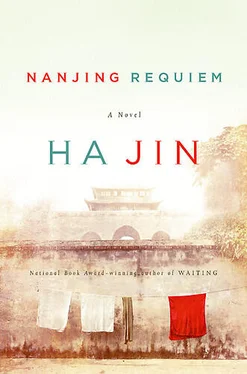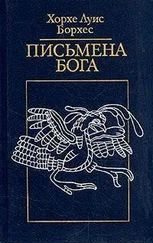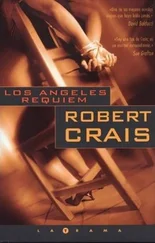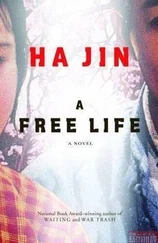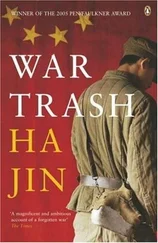While Ban was speaking, I jotted down what he said.
MORNING, ANLING,” Minnie greeted me as I was approaching the Central Building, the largest one at Jinling Women’s College. Together we headed for President Wu’s quarters in the Southern Hill Residence, where we were scheduled for breakfast. The late November air was frosty, and I could see wisps of breath hanging around people’s faces when we passed them. A skein of mallards was drifting north, squawking loudly, their wings paddling like tiny oars. Then the whole flock became invisible in the livid sky. The mountainous clouds looked heavy with rain, which meant that no Japanese bombers would come today. So in spite of the cold and damp weather, people would say “Such a nice day” when they met. Overcast skies put everyone in a better mood.
Dr. Wu had been sorting and packing the school’s papers because she was planning to take some of them away with her. A number of our Chinese faculty members had also been preparing to leave. Many staffers had nowhere to go, yet they too were busy, hiding away food and valuables. Minnie hadn’t packed a thing. As the dean of the college, she wanted to remain behind. She told me, “If I lose anything, I might lose all.”
Dr. Wu was waiting for us, in cheerful spirits. On the table were toasted slices of baguette, a bar of butter in a dish, a sauceboat of jam, and a jar of mayonnaise. At the sight of the Western breakfast, Minnie’s eyes twinkled. She said, “Wow, I’ve been eating rice porridge and salted peanuts every morning for weeks. Where did you get these?”
“Madame Chiang gave them to me yesterday,” Dr. Wu answered, adjusting her eyeglasses with her fingertips. She often went to see the first lady, as both of them had been educated in the United States — Madame Chiang had gone to Wellesley and Dr. Wu had earned her PhD in entomology from the University of Michigan. She’d been an executive member of the Women’s War Relief Association headed by Madame Chiang and had held many meetings and rallies to garner support for our army and to solicit donations for orphanages and refugees. Dr. Wu was a minor celebrity, the first Chinese woman who had earned a doctorate in the United States. She was one of the first five graduates of Jinling and had succeeded Mrs. Dennison as its president in 1928, when our government stipulated that all foreign colleges and universities in China must be headed by Chinese citizens. “Sit down. Let’s eat while we talk,” Dr. Wu told us. She was wearing a black silk tunic with a brass button like a huge coin at its neck. Despite being in her late thirties, she looked youthful, with bright vivid eyes and high cheekbones, probably because she wasn’t married and had never been burdened with children and housework.
I poured boiled water from a thermos into three mugs to dissolve the powdered milk and then handed Dr. Wu and Minnie each a mug.
“Thanks,” Minnie said, spreading the toast thinly with both jam and mayonnaise. She took a bite. “Hmm, what a treat! I wish there were eggs scrambled with ham, cheese, and mushrooms,” she said in her slightly accented Mandarin. “How I miss a hearty Midwestern breakfast.”
“Me too,” Dr. Wu said. “I miss bacon.”
We all laughed. I took a sip of the hot milk, which tasted rich and sweetish. I wished I could save my mug for Fanfan, my two-year-old grandson.
Our school’s board of founders in New York had just instructed Dr. Wu to join the Jinling group that had recently moved to Chengdu, in western China, while Minnie Vautrin, as she herself had requested, was to stay behind in Nanjing as the head of our college for the time being. Dr. Wu had asked me, and I had agreed, to remain here and help Minnie run the school. The three of us still needed to make plans for safeguarding the campus. The valuables in our vault would be packed in a huge portmanteau to be delivered to the U.S. embassy. We dreaded being looted by Chinese troops, who were notorious for their unruliness, especially when they were frustrated and desperate.
“The embassy is going to evacuate onto the Panay , I’m told,” Minnie said, referring to a U.S. gunboat.
“That’s all right.” Dr. Wu sloshed her milk and took a mouthful. “It will be safer to put our stuff in their charge.”
“Where should we hide our cash?” I asked.
We all believed that soon no bank would be open in town and there would be widespread shortages. Dr. Wu smiled and suggested that we leave one hundred yuan in the vault and hide the rest, more than four thousand in total, in different places known only to Minnie and me. Minnie asked me, “Isn’t Mrs. Dennison’s silver in the vault too?”
“Yes, what should we do about that?” I said.
“Is it an expensive set?” asked Dr. Wu.
“I don’t know.”
“It’s her wedding silver,” Minnie replied, “a fancy set, probably worth four hundred yuan.”
“Pack it into the portmanteau,” said the president.
Minnie briefed us about the work that the International Committee for the Nanjing Safety Zone had been doing. That relief association had just been established by some foreigners who were remaining behind despite their embassies’ urging them to leave. The Safety Zone would be a neutral district in the center of Nanjing, in an area of about two and a half square miles, where foreign embassies, consulates, and some mission schools were located; it was meant to provide sanctuary for noncombatants. The city officials supported the foreigners’ effort and had given them eighty thousand yuan in cash and forty-five tons of rice and flour to set up camps for refugees. Thank heaven the rice crop was good in the Yangtze Valley this year. So there was plenty of rice in the city, but trucks were at a premium and often commandeered by the military, and so were unavailable for transporting the promised rations into the neutral zone. Some departing troops would have burned hundreds of tons of rice stored near the riverside in Hsia Gwan if the Safety Zone Committee had not intervened. Generalissimo Chiang had personally offered a hundred thousand yuan to the committee as well, though to date only forty thousand had been delivered. The Japanese authorities, whom the committee had contacted by way of the U.S. embassy, did not respond directly to the proposal concerning the neutral zone but stated that the Imperial Army would “try to respect the district as far as consistent with military necessity.”
The Safety Zone Committee was composed of fifteen men — Americans and Europeans, most of them missionaries, as well as some businessmen and academics. It was chaired by John Rabe, a fifty-five-year-old German and the representative of the Nanjing office of Siemens, the company that had built our city’s telephone system, maintained the turbines of our power plant, and supplied modern equipment for our hospitals. Rabe also ran a small German school, which he would open, together with his home, to the refugees. There were no women on the Safety Zone Committee, because it was understood that its members might have to run unimaginable risks, including confronting the soldiers in person. Two American women, however, were actively involved in the relief work: Minnie Vautrin and Holly Thornton, a widow of forty who was now a naturalized Chinese citizen. Holly, a friend of mine, was a part-time English broadcaster. Both Minnie and Holly were on the Nanjing International Red Cross Committee, which was headed by Reverend John Magee. Some of the American men were on both the Safety Zone Committee and the Red Cross Committee.
Having heard Minnie’s report about the relief work and the prospect of using Jinling as a refugee camp for women and children, Dr. Wu lowered her head, her hair short like an overgrown crew cut and her eyes dim and watery. She turned pensive for a moment, then said to Minnie, “Do whatever you feel is appropriate and necessary. I can’t stop thinking about how badly the foreigners were treated here ten years ago. Now, only a group of foreigners can help the refugees. What a shame.”
Читать дальше
